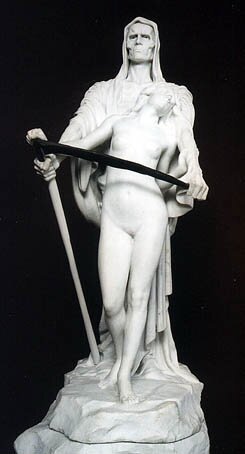
In Greek mythology, Thanatos was the god who personified death. He appears in the Theogony of Hesiod as the son of Nyx (Night):
"Night gave birth to hideous Moros and black Ker
and then to Death and Sleep and to the brood of Dreams."
The Greek poet Hesiod therefore claims that Thanatos is the brother of Hypnos, the god of Sleep. Indeed, the two gods together play a role in Homer's Iliad. In one poignant scene of the epic, Thanatos and Hypnos join forces to remove the hero Sarpedon's body from the battle field. This scene features Zeus speaking to Apollo:
"Come, dear Phoebus,
wipe away the blood mantling Sarpedon;
take him up, out of the play of spears,
a long way off, and wash him in the river,
anoint him with ambrosia, put ambrosial
clothing on him. Then have him conveyed
by those escorting spirits quick as wind,
sweet Sleep and Death, who are twin brothers. These
will set him down in the rich broad land of Lykia,
and there his kin and friends may bury him
with tomb and stone, the trophies of the dead."
Thanatos also had a small but significant part in the story of the Greek heroine Alcestis. According to the play by Euripides, in order for the hero Herakles to rescue Alcestis, he had first to wrestle - and defeat - the god of death. Euripides describes Thanatos as "the dark-robed lord of the dead" in this tale. But in this version of the myth valiant Herakles overcomes his daunting opponent, and Thanatos loses Alcestis.
